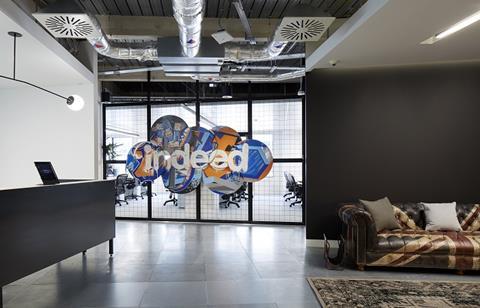
Global recruitment search engine Indeed aims to provide users with an exceptional experience finding new and exciting careers. With this insight into the world of employment, Indeed also grasps the importance of using both local and global benefits to engage and support its 7,400 employees worldwide.
Bryan Chaney, director, global employer brand and talent attraction at Indeed, says: “Our benefits exist to attract, engage and retain talent. We get employees engaged, and that helps them be productive, but it also keeps them at the organisation. It focuses on retention, because if employees are engaged, they are happy and they are challenged, then they are more likely to stay.”
This is more than just a simple tick-box exercise; with employees based across 28 offices in 14 countries, there is plenty to consider in terms of benefits and rewards.
Addressing work-life balance
The biggest success of Indeed’s benefits strategy, according to Chaney, is its global open annual leave policy, introduced in January 2016. This policy states that there are no minimum or maximum leave allowances for full-time employees across the globe, with the only restriction being that all leave must be approved by their manager.
The motivation for introducing the leave policy centred around improving work-life balance, as well as awarding employees with the trust and autonomy to manage their own workloads and schedules. “Not only is it better for people to be able to take time off when they need it, so they’re not worrying when they have emergencies or they need balance in their life, but if [we] treat people like adults, they typically behave like adults.
"It’s giving [employees] that freedom to make the decision, use their time how they need to use it to hit their goals,” Chaney explains.
Since the introduction, there has been a 20% increase in the number of vacation days taken by employees globally, and a 30% increase in the number of vacation days taken by US-based staff.
To launch the open annual leave policy, Indeed employed a marketing strategy that included an internal blog, advertising across TV screens at all office locations, postcard drops at some sites, and a question and answer interview session with the head of HR.
One key communication method saw senior leaders acting as role models, to ensure staff understood the full scope of the policy, while eliminating potential negative assumptions.
Chaney says: “We’ve worked with our managers and HR leaders to make sure that they’re communicating that we want people to take time off, and a lot of that comes from the executive level across the organisation. They need to be taking the time off so that everyone beneath them understands that that’s something that’s not just encouraged, but valued.”
Supporting parents
Indeed also offers a global minimum standard for both its maternity and paternity leave arrangements. This enables employees to take a minimum of 12 weeks of fully-paid maternity leave, or a minimum six weeks of fully-paid paternity leave.
“We want to make sure that the people who are growing their families can actually take care of them and take the time off,” Chaney adds.
Employees are also able to adopt flexible working arrangements as well as remote and virtual working opportunities. However, Chaney emphasises that employees still need to be present on-site, in order to connect and liaise with colleagues. “People need to come into the offices to get a lot of their jobs done, but also to connect with their co-workers," he explains. "But there’s a lot of flexibility to be able to do that.”
The global challenge
For Indeed, striking the right balance in terms of benefits and reward across all of its operating jurisdictions takes time and effort, mainly from its dedicated compensation team.
“We have a lot of benefits packages,” notes Chaney. “Some are global and some of them are very specific to the market. We actually go through and do the research. We have an entire compensation team who go through and do the research around competition and the things that are most important in the region.”
Having a global workforce also influences the communications approach, which tends to be digitally focused and will feature components such as question and answer videos. The organisation also uses an internal social networking platform.
“We are digital first, but we understand the value of face-to-face and we encourage that; we have the space for it, we have the technology for it. So, it really depends upon the market,” adds Chaney.
Employee wellbeing
Having a global workforce can also impact the timeline of certain benefits; for example, although each office hosts a wellbeing week at least once a year, the month it occurs varies from site to site. In the UK, the last wellbeing week was held in September 2018 for around 100 employees. This included a wellness talk, health screenings, access to gym classes and facilities, manicures, massages and an office wellness quiz.
To further support wellbeing, Indeed facilitates employee-led inclusion resource groups; these have been operating for the past two years and are created dependent on the needs of individual office sites.
These groups work to organise specific events and meetings, as well as offer courses on unconscious bias, cultural intelligence and ally skills. Examples of some of Indeed’s inclusion resource groups are its Asian network, Black inclusion group, Generation Next, Latinos in tech, iPride and Women at Indeed.
“We want to make sure people can identify with employees with similar backgrounds, so they feel like they belong and we support that,” Chaney explains.
What employees want
Indeed primarily uncovers how employees feel about their work and benefits using a global engagement survey. This is conducted twice a year in the first and third quarters. The survey last received a 74% response rate, and specifically tackles employee benefits, asking staff if they feel valued, if they feel compensated and rewarded and what other perks they would like to receive.
Keeping a finger on the pulse of what strategies will engage and retain a globally dispersed employee demographic is of clear importance to Indeed. Chaney concludes: “We actually have a global attrition rate of [15%]. Keeping our employees happy and engaged is right at the top of the priority list. We’ve been hiring a lot, we’ve been growing exponentially over the past few years, so we’ve been able to maintain a good retention rate of those employees.”
At a glance
Indeed is a global recruitment website that indexes available jobs around the world; this enables the organisation to provide research, information and guidance to help job seekers make the best decisions for their careers.
The organisation has more than 7,400 employees across 28 offices in 14 countries, primarily hiring sales and software engineering staff. Other job roles include marketing, HR, relationship management and technical support. The average age of employees globally is 33.
Business objectives
- To expand into more countries.
- To continue to put job seekers first to ensure they have a great experience with Indeed.
- To increase the usage of Indeed by job seekers.
- To help organisations develop an online employer brand.

Career history
Bryan Chaney, director, global employer brand and talent attraction, joined Indeed in 2015. Having spent 14 years of his career working in recruitment and marketing, Chaney’s roles prior to his time at Indeed include global sourcing and employer brand leader at cloud communications organisation Twilio, and recruitment sourcing executive at technology firm IBM. He is also the co-founder of Talent Brand Alliance, a community for employer branding, recruitment and marketing professionals.
Chaney describes his proudest career achievement to date as the work he has done at Indeed to help create the organisation’s distinctive culture, which emphasises good employee experiences. He says: “My biggest achievement is to launch a culture brand or talent brand like we have inside Indeed. To focus on marketing and selling the opportunity at [an organisation] where the employees are treated well is really, really rewarding.”
Read more...











